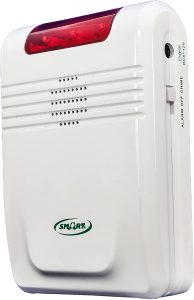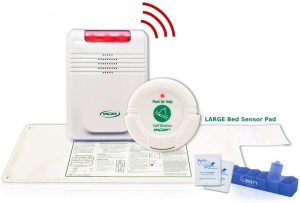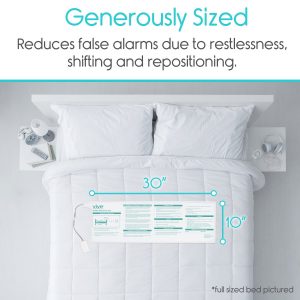As we age, it becomes harder to wake up. There are many reasons for this – physiological changes in sleep cycles, medications that make us dizzy, and the fact that our body’s natural clock is ticking away even if we’re not getting enough light or exercise. Bed alarms for the elderly are a great invention to help with this problem because they will alert you when you set them, so your old brain doesn’t need to do any work! If you have trouble waking up during your day, check out these bed alarms below for solutions.
What is a bed alarm system for the elderly?
Bed alarms for the elderly are an alarm clock system that wakes the user up during a specific time in the morning. It is most often used by individuals who have trouble waking up on their own due to various reasons such as lack of sleep, medications, or age-related changes in wakefulness cycles. Bed alarms can be installed either near one’s bed or inside it, so they will go off no matter what and gradually get louder until you awaken from your slumber (or turn them off if you’re not ready).
The best bed alarms for the elderly should have adjustable volume control with different tones because this gives more people options. Additionally, many bed alarms also include backup battery power, which means they won’t shut down when the electricity goes out, a helpful feature that ensures you’ll be woken up even in the middle of an emergency.
Bed alarms may seem to offer easy solutions for those who are hard to wake, but there’s no such thing as 100% practical because they only work if one is asleep when it goes off. You might also get used to them and thus not hear them go off, so best bed alarms should have a sensor that detects motion or light levels and wakes the alarm system user before they fall into deep sleep again!
A sensor detects motion or light levels and wakes the user before they fall into deep sleep again. This is an excellent way to ensure elderly individuals are awake enough, so they don’t have accidents due to drowsiness.
Benefits of using a bed alarm for elderly
The benefits of using bed alarms for the elderly and seniors are numerous:
- They help those who have trouble waking up on their own because it wakes them at the time set by themselves with light or loud sound (or vibration if you’re in your late stages).
- Since it helps them wake up on time, many people find that they get more sleep, leading to better health habits overall.
- These devices do not require any work from the user!
Bed alarms may seem like an easy fix, but there’s no such thing as 100% effective, so best bed alarms should also contain a sensor that detects motion or light levels. This way, users will be woken before falling back into deep sleep again; this is especially important for the elderly who may have accidents due to drowsiness. Lastly, bed alarms are a helpful way of making sure that those with sleep apnea will be alerted in the morning so they can stop snoring and start feeling better!
Benefits:
- Relatives know when an elderly person wakes up with a bed alarm and starts their day feeling refreshed!
- Helps individuals wake up on their own when it becomes difficult to do so as we age because our bodies’ natural clock is ticking away even if we’re not getting enough light or exercise;
- Many find more time sleeping means healthier habits overall (like less stress);
- Bed alarm devices don’t require any work from users; sensors help prevent accidental oversights by detecting motion/light levels before one falls back into deep sleep again. This last benefit is significant for the elderly who may have accidents due to drowsiness.
Prevents wandering
Bed alarms can help people with dementia wander less because they know that the alarm will go off at a specific time. Bed alarms are an excellent way to alert those who walk and become lost, which is often a dangerous situation for elderly individuals without their glasses or contact lenses.
Prevents Wandering:
- Alerts one when it’s time to get up, so they don’t stay in bed too long; this helps prevent wandering behavior like slipping out of bed unnoticed (which may lead to falls); stops episodes where someone gets confused and goes into another room not recognizing what they were doing there; alerts relatives if somebody wanders away from home before getting back on track again.
Important Note: While these devices are helpful for those at risk of wandering behavior, please be aware that some people may become aggressive when their alarm goes off.
Helps to reduce falls
Bed alarms can help reduce falls in those who are elderly and have sleep apnea. When someone with this condition wakes up to the sound of their terror, it interrupts a snoring cycle and reduces sedentary episodes–allowing them time to get moving so they don’t fall asleep again! As such, bed alarms may be helpful for seniors who have insomnia or other chronic ailments that affect their ability to stay awake during certain times of the day.
Helps Reduce Falls:
- Alerts one when it’s time to wake up, which helps them avoid waking up in deep stages causing accidents; alerts relatives if somebody falls while wandering away from home before returning on track again; improves health by reducing drowsiness/snoring cycles and sedentary episodes.
Types of bed alarms
There are three types of bed alarms for the elderly.
- Traditional bed alarm: this type of device is the most basic and does not have additional features like sensors.
- Bed alarms with a sensor: these devices are more expensive but can detect motion/light levels to ensure that someone doesn’t fall back into deep sleep again after being woken up by the sound or vibration; less likely for seniors to have accidents because they know it’s time to get up when their alarm goes off–no need to move from one side of the bed to another physically!
- Smart Bed Alarms: monitors pulses, heart rate, temperature, etc., so you don’t even have to worry about getting out of bed at all for them to work! This last option includes built-in features like a call button, a two-way communication system, and an SOS emergency alert.
What to consider when purchasing a bed alarm for elderly
Alarm options
- Traditional Alarms have a louder sound than other options, and most are battery-operated, so they’re portable.
- Bed alarms with sensors: these devices include sensors that detect motion/light levels to ensure seniors don’t fall back into a deep sleep after being woken up by the alarm–less likely for accidents; cost more but worth it if you want an advanced device!
- Smart bed alarms: monitors pulses, heart rate, temperature, etc.; includes call button and SOS emergency alert built-in. The downside is they can be expensive (but may also help those who need them).
Looking at all of your options will ultimately decide what type of bed alarm is best for elderly individuals based on their needs. But no matter which notices you choose, it’s important that seniors can hear the alarm to be effective.
Alarm sound/volume
The sound of a bed alarm should be loud enough for somebody who’s elderly to hear, and it needs to have at least one volume setting.
f the person has hearing loss, then an audible or vibrating alarm would work best.
The volume should be audible to the elderly when they are in bed, but it shouldn’t disturb their partner if they’re still sleeping.
A sound that’s too loud and jarring may wake up a sleeper who is on the other side of the room–if this happens, then an alarm with different levels or a vibrating option would work better.
Power source/batteries
- Bed alarms with a sensor can range from having traditional batteries or rechargeable ones that have an indicator light when they’re running low on power; they also require more frequent charging
- Bed alarms with Smart technology (including sensors) will most likely come equipped with the option for either regular or rechargeable batteries. This is because these devices tend to use up the battery life faster to provide increased functionality. Battery life ranges depending on your individual needs, but it’s best to purchase extra sets, so there’s some backup!
- If you want a device that runs on batteries, it’s crucial to have one with multiple alerts when the battery is running low.
The last thing anybody wants is for their alarm to go off and not be able to wake up because they’re out of power!
A bed alarm should never come without some indicator light or alert system–this way, seniors know if they need a new set of batteries before it’s too late.
For example, many devices will start sounding intermittent to warn users about how much time remains until the battery dies; others may blink red at slower intervals, so there’s more warning. It also helps parents (or other caregivers) who might watch over them while they sleep easier to know if their loved one needs a new set of batteries.
Wired vs. wireless systems
- This can be based on preference and what your needs are.
- Wired alarms have the advantage of being able to plug into other devices (TV, radio), so they’re not reliant on batteries for power–this is especially helpful if you don’t want a cord hanging from an alarm that’s close to the floor/wall
- Wireless systems provide more mobility because there isn’t anything plugged in; benefits include less likelihood of snagging wires or cords when moving about but also must ensure the receiver is within range before bedtime!
The best Bed Alarms for the Elderly will depend on individual needs which type may work better for them: wired vs. wireless. Both offer advantages such as uninterrupted service, ease of use, respectively. It just depends on what you need.
Pad materials
- If you’re looking for a pad to use with the bed alarm, then it’s essential to know that this will need regular cleaning because of all the bodily fluids and oils.
- A mattress pad can help keep your sheets clean by creating an absorbent surface; they also offer some extra warmth in winter months—but if someone has arthritis or other back problems, then there should be no more than one quilted attachment on either side so as not to put too much pressure on their joints.
The material used for these pads typically ranges from cotton and wool blends to polyester, which is a good option depending on your needs! Durable materials like cotton may withstand stains better but aren’t always warm enough in the winter.
The pads that work best will be easy to clean and durable, so they don’t often need replacing–and won’t cause any pain or discomfort for someone with back issues.
- If you’re in a high humidity area, then it’s vital to have a pad made from breathable materials like cotton because polyester tends to retain more moisture which is not good when there’s already increased risk for bed sores! This also makes it easier as far as changing sheets—pull out the old sheet and replace it with a new one; no need to worry about soaking through multiple layers before getting all the way down if using a wool blend material instead.
Reviews of best bed alarms for seniors
- The Ring Alarm is the most popular choice for Americans and Canadians.
- It’s slightly more expensive than other products but worth it because it offers many features suited to a senior’s needs like an emergency button, adjustable motion sensitivity, wireless connection to smartphones in case of emergencies. This product also has the advantage of being able to plug into external power sources, so there is always uninterrupted service when batteries run out or if something happens with the electric grid; any time there is a power outage, this can still work as well!

This is a system of sensors that can recognize when someone has fallen out of bed.
It’s also able to detect if there are any changes in heart rate or breathing and will automatically call for help with the use of an app on your phone; this product offers many advantages like it doesn’t rely solely on sound, so false alarms would be rarer, it could save lives! If you’re worried about caring for a loved one but want some peace of mind knowing they’ll get immediate assistance if they ever need it, then this might work well for you.
The best Bed Alarms for the Elderly may depend on individual needs which type suits them better–but reviews show Ring Alarm is the most popular choice among Americans and Canadians.
This product is advantageous in case of a power outage because it can plug into external power sources.
The emergency button on the product allows for help in any situation that may arise–even if the person’s phone dies or they’re impaired by something like dementia! This sensor system will automatically call for help with the use of an app on your phone, so you never have to worry about not being able to find someone who might need assistance even when their phone runs out of battery life or they are unable to answer; no more false alarms as well since sensors detect changes in heart rate and breathing patterns rather than solely relying on sound detection. If you care profoundly but want some peace of mind knowing someone could get immediate assistance if they ever need it, this product could work well for you.
The Foam Pad by Soft Touch is the best option if your loved one has sensitive skin or problems with pressure points on their back–it’s made from 100% pure cotton and hypoallergenic wool, which provides a soft, comfortable sleep throughout the night!
This material also helps prevent bedsores, so there are more minor instances of these occurring because it moves easier without putting too much weight onto any particular area.
Soft pads like this help make someone feel more independent as they’re able to do things themselves while still being safe at home; slip into bed, and be tucked in for a good night’s rest, even when preparing for something like surgery or a hospital stay. This also helps prevent bedsores that are not good when there’s already increased risk for these!
The Safety Zone is another great option if your loved one has trouble with mobility and needs something that will help them feel safer being in slippery conditions–since it uses suction cups, this product won’t slide around the floor. Hence, they’re less likely to fall out of bed themselves.
Another advantage: There’s a large window on the backside that can be used as a safety monitor by someone who might need some assistance caring for their loved one but want peace of mind about what’s happening while they aren’t at home. Not only does this protect from falls, but it also makes changing sheets easier.
If your loved one has a larger bed, this product would also be perfect for you because it offers two separate pads that cover the entire mattress, so there are no gaps in between!
- This sensor system can recognize when someone has fallen out of bed
- The product offers many advantages: it doesn’t rely solely on sound, so false alarms would be rarer and could save lives
- Some customers said this product is expensive

The cordless bed pressure alarm mat by Smart Caregiver is an excellent option for people who may not need the added security of having an alarm on their wrist or chest. It’s also perfect if you’re looking to keep some distance from your loved ones and ensure they don’t get out of bed without assistance. This device can detect pressure, so it alerts caregivers when someone gets up or lies down in bed with excessive force–this will let them know that there might be cause for concern! There are two different settings: sound only and light & vibration. The sound-only setting could come in handy as a gentle reminder, like when children have difficulty waking themselves up during nap time. The vibrating sensor is good at detecting less-forceful movements. It’s also capable of detecting a fall that may result in injury and can be set to provide an alarm if it detects this type of event–giving family members peace of mind as they care for loved ones at home! You’ll receive one light & vibration alarm mat with four AA batteries included, two extra pressure pads (one with adhesive backing), six pre-cut peel-and-stick patches, three self-adhesive tapes, and instructions on how to get started.
- Cordless
- Detects falls that may result in injury
- No alarm on the wrist or chest

The Smart Caregiver system is one of the most popular short-term bed alarms for the elderly. The company claims that it can be applied in just a few seconds and offer peace of mind to families with loved ones living alone or those feeling unsafe due to health conditions, such as Alzheimer’s disease. It comes with an adjustable waistband sensor pad that monitors when you lie down on your back or side. When you change position while wearing this device, the alarm will sound if set up correctly.
Tiredness sensors monitor how much sleepiness there might be in your voice by picking up vibrations inside your throat. If they detect high levels of tiredness during early morning hours, the alarm will sound to help you get up and moving.
The sensors in this device are meant for short-term use only, but it is a reasonably priced option. It does not come with all of the features found in other options on our list, so keep that in mind if the price is your number one consideration.
- Affordable price
- Simple to apply and adjust settings
- Limited features
- Only meant for short-term use.

This bed alarm for the elderly is marketed as a “secure, discreet and effective solution”. The Secure 45BSET-Y comes with two adjustable waistbands that connect to the sensor pads so your loved one can sleep on their side without fear of an accident or injury happening while they are sleeping. It also has motion sensors that will sound when it detects movement nearby, including if you leave the house through its automatic door chime feature. You don’t have to worry about false alarms from this device because there is no clapperboard to set off the alarm; instead, it uses geofencing technology by setting up a perimeter around your home using a Bluetooth range detection system and then monitoring intruders via infrared sensing capability. When it detects someone, the alarm will sound, and you can set up custom notifications to your smartphone so that anyone nearby knows what’s happening.
- Superior security features for those who are concerned about intruders entering their home
- No false alarms from this device since clapper technology is not used
- Ability to customize notification settings on your phone
- Applying this device can be difficult for those with weaker hands
- The price is a little higher than other options on our list.

The Smart Caregiver cordless bed pressure alarm mat is one of the most popular options on our list. It’s a good choice for those looking for an affordable device that will help them sleep soundly while feeling secure in their home. The mattress pad has two adjustable sensor pads that monitor when you lie down and change position in your sleep. When it detects motion, it sounds the alarm to alert you about any potential dangers nearby.
This product comes with a call button. If you wake up or fall asleep before setting off the audible alarm, pressing this button can initiate alerts through text messages and phone calls from family members or friends. This feature is helpful because there have been cases where people have fallen victim to home invasions or burglaries while they were asleep.
The Smart Caregiver cordless bed pressure alarm mat has a longer battery life than other devices on our list, making it a good choice for those looking for an all-day solution. It also comes with five adjustable sensor pads so you can position them in the most comfortable way possible.
- Longer battery life means this device is appropriate for 24-hour use
- Comes with a call button and text messaging alerts if there’s any movement detected when wearing these sensors
- Some people may find the sensor pads to be too sticky and uncomfortable.

This is a popular choice for those looking for an affordable yet very effective device that will help them sleep soundly while feeling secure in their home. The Smart Caregiver primary pull string monitor has a bell that can be pulled to activate the alarm and alert you about any potential dangers nearby. It also comes with an adjustable sensor pad, so your loved one doesn’t have to worry about getting out of bed or injuring themselves when they need to use the restroom during the night. When it detects motion, such as if someone tries opening doors of cabinets near where these sensors are located, then this product’s alarm will sound off until somebody removes it from its place on the ground.
- Affordable price point
- Easier for those with limited mobility to use
- It might be too loud for some people

The Vive Wireless Bed Alarm Mat is a great bed alarm for the elderly. This mat sits at the edge of your mattress and connects to an app on your phone, so you can control it remotely from anywhere in case of an emergency. It also has a sensor that will detect if someone falls out of bed, which activates the alarm automatically when triggered. In addition, this wireless system doesn’t require any wiring or installation – stick it under your sheets!
You can also set it up to text or call your emergency contact, so they know you are safe, which is a nice feature. The battery lasts for months between charges, and there’s an alarm clock built-in too!
The Vive Wireless Bed Alarm Mat has been designed specifically with the elderly in mind. It even includes sensors that will detect when someone falls out of bed, automatically triggering the alarm without manual intervention from the user. This wireless system doesn’t require any wiring or installation – stick it under your sheets! You can also set this mat up to text or call your emergency contact if needed- such a thoughtful addition. The battery life on this baby lasts long enough that you won’t be charging it very often.
- No wiring or installation is required
- No need to manually activate the alarm in case of emergency
- Automatically detects if someone falls out of bed, activating the alarm automatically
- Requires a smartphone with an internet connection (or another way for monitoring)
FAQ
Conclusion
The elderly are at an increased risk of falls. Falls can lead to severe injuries and living in a nursing home or assisted-living facility for the rest of their lives, depending on how bad it is. This is why Bed Alarms for the Elderly should be used to prevent these accidents from happening in the first place. With so many brands out there, what makes one better than another? We’ve got you covered!